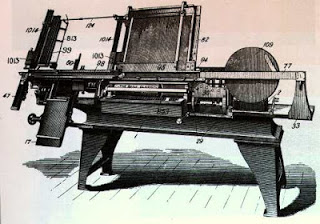That night we find shelter at an EconoLodge in West Liberty, Iowa. No movie tonight. We are locked onto the Weather Channel, another niche channel that on any other night would, like ESPN 2 through 345, register as more cable media segmentation to the point of lunacy. (Give me that old time Walter Cronkite any day; at least all the white middle class folks had something in common the next morning at work instead of locking in to programming that only reflects their micro world.) Would seem like ESPN with radar screens except tonight when getting through the next 24 hours will be an obstacle course.
Cheryl looks at the radar on the screen and intuits how the system is descending out of the North. She makes a call. Leave early in the morning, avoid the snow moving into Iowa the next day, sleep during the storm somewhere in Nebraska and (hopefully) the snow will be cleared out in Wyoming on the last day of our trek.
We turn off the lights and try to find our way into sleep. In my dreams I’m in a Victorian house that you might find Mark Twain living in outside Hartford, Connecticut. It’s a museum now but filled with toys from every era of the American experiment. But these aren’t your run-of-the-mill wooden blocks and hoops and sticks. Based on the placards that I cannot see for some reason, the artifacts are supposed to be inventions of sorts: vacuum cleaners that serve martinis as they move around the house by themselves, contraptions that lower and raise the lip of doors so that shuffling houseguests don’t trip, contraptions with gears and pulleys that grind and whirr, an electric car. It’s all a weird cross between The Jetsons and steam punk and as I wander around the house trying to read the placards, I end up on the second floor where Twain’s spectacularly failed printing machine The Paige Compositor sits like a giant paper weight that might eat you. I am familiar with this machine, how Twain used the royalties from The Adventures of Huckleberry Finn to finance this new printing press in 1889 which would, he thought, be the beginning of a new information age, and make him a fortune. In the end the Linotype beat out the Compositor with its 18,000 parts and sent its inventor to the poor house and Twain into bankruptcy. Then I hear the sound of a pinball machine in the next room. Joe is there, leaning over the slanted glass top, one hand on each side, fingers to the buttons. I move around to look through his long hair which, without a hat, hangs over his face, but I can’t get far enough around. Suddenly the house blasts away on jet engines located on either side, and it’s an airplane leaving to go west and the pinball machine lights up “Tilt,” Tilt.”
We awake to ice. It is Saturday, December 31, 2010 and, peering out of the motel window, through the fog, it is clear that we are no longer in the East. We have made our bumpy, haphazard way through the seaboard, the hardwoods, the great lakes and cities of Illinois and Indiana and now I-80 is straightening and stretching, plumbed west, the chalk line snapped hard against the frozen ground so that there is no way to get lost. It must have been this way for the pioneers. Or so they thought. “How hard can it be to get through Iowa?”
Downstairs in the astringent lobby, breakfast awaits us. There are 4 pieces of bread under a plastic dome waiting to be toasted. Clearly a fourth guest arrived during the night, making us four. I can see that the owner who checked us in late last night when we decided that Iowa City was just too…damn…far away, has carefully sectioned off four slices of Wonder Bread with his brown Indian hands and went to bed. In the matter of a decade, it seems, Pakistanis and Indians have taken over the shitty road-side motels of America. It’s like they have a network of secret Hindu handshakes, or more realistically, a website in Sanskrit and Urdu fronted by a round-eyed, dark-haired sub-continent beauty with a potu in the middle of her forehead declaiming how, in the middle of a corn field outside Iowa City, USA, your American Dream Awaits!
We don’t bother with the toast. At this point in our cross-country journey, the only thing that makes sense is to grab a cup of very bad coffee and a small box of Sugar Pops half of which will end up between the two front seats of the Corolla as we shovel it in dry along the, now icy, interstate we’ve come to believe is our home. But today the way is not clear…and it is definitely not safe.
Ice is everywhere, like a glaze that has formed out of the frigid air. The grass is coated, the trees are burdened down like the severed claws from a rooster, upside down, the road signs crystalline. And of course the road, which seems fine at first as we pass through the fog of the city where the hospital and sports arena are, inexplicably linked together (same green exit sign) and ubiquitous water towers, reminiscent of stylized mushroom clouds, peer through the mist. We’re in the middle of painter Andrew Wyeth’s “Christina’s World” but frozen and, eventually, sporting signs for Amana Colonies–seven historic German-American prairie villages—and Kinze Manufacturing.
There is a sign for Herbert Hoover highway. I wonder if there are historic colonies of Great Depression era shanties—Hoovervilles—restored and gleaming with gift shoppes ready for the holiday haul. Probably not. Too reminiscent of what they’re calling the Great Recession of 2008, which is supposed to be receding. But where?
We are sliding. So we slow. We are creeping, feeling our way. I’m at the wheel and Cheryl is leaning forward as if the 18 extra inches are going to help her see her way through this soup. We come up on a slight hill and down in the median is a car, tits up. This is where my first responder Flight Attendant chutzpah kicks in. It never occurs to me that we won’t stop, and render help. It’s me at my best—rushing into a burning house, if need be. It’s the ultimate antidote to my armchair cynicism toward the world, and it’s fairly leaping out of me, even before I pull over to the breakdown lane and put the Corolla into park.
Cheryl is saying something to me along the lines of “What should we do?” “Who do we call?” “Where are you going?” But I’m already out in the freezing rain, the glory of the world literally in my face, stinging my ears. I’m not sure if it’s the cold or the adrenaline. An SUV from the East-bound side has pulled over next to the median, the driver out, in a baseball hat standing there, waiting to cross, looking hesitant, like he’s not sure he wants to get involved. Another SUV/mini-van has pulled into the left break-down lane on the opposite side. He wants to know if anyone is in the car. I shrug my shoulders, palms up, irritated somehow at his query: can’t he see that I just fucking got here? I’m on the wrong side of the car which has flipped over, and I’m all turned around. There is mud and yellow grass crammed between the rear right wheel well and tire. When I peer in there is an interior smell of cigarettes, human sweat and damp upholstery, the forward brake light is still on, below a crushed plastic covering. The contents of the car have re-materialized on the damp headliner—clusters of coins, cigarette butts, Cheetos, cellophane wrappers of every stripe. The seat belts dangle from bottom to top, twisted, curiously sprung out of shape so that they’re limp. This is disorienting, and even in an emergency like this, it feels invasive, like I’ve just opened a door on someone’s pathetic, claustrophobic life.
No one is in the car.
How long has this been here? I look around outside. The guy standing above me from the other side has his hands in his pockets by now and is looking back at his honey in his mini-van. He’s still trying to decide if this drama is over. If he can step away with any semblance of a clear conscience and head back out, toward Indiana. We are two travelers headed in opposite directions and the only thing we have in common is this toppled Honda Accord and the Iowan wind biting at us. The occupant of this car should be somewhere, right? Maybe he was drunk and didn’t want to get caught. Maybe he had stolen the car at the last truck stop, sped out of control coming down from this knoll on I-80, lost control, crashed then bolted across the spent fields outside Des Moines. Maybe.
I shrug at my compatriot, turn to the guy in the car on our side who is now pulling away. Continuing on. “Nobody here,” I shout. “Guy’s gone.” I turn. Cheryl and Joe are still in the car, behind fogged glass. I’m actually a little disappointed. Flight Attendant Dave flies down I-80 aisle, first aid kit in tow, passengers everywhere turning in their seats, a woman screaming but, alas, it is nothing: a man choking on a now dislodged chicken bone, or even worse, a man choking on a chicken bone who is no longer even there.
“What’s going on?” says Cheryl when I open the car door. “Are they okay?” Joe is wide-eyed but calm.
“Nobody’s there.” I slide in behind the wheel. “It’s just sitting there.” I turn the key and roll down the frosted window so that I can see clearly over my left shoulder before pulling out.
“Damn thing’s just sittin’ there.”
“Well, at least no one was hurt.”
“No one that we know of anyway,” I conclude, mentally returning the first aid kit to its overhead compartment.

